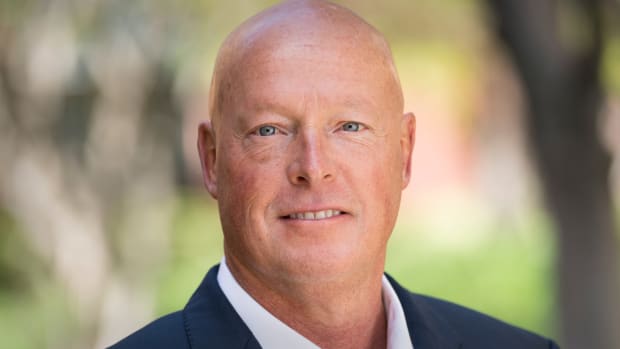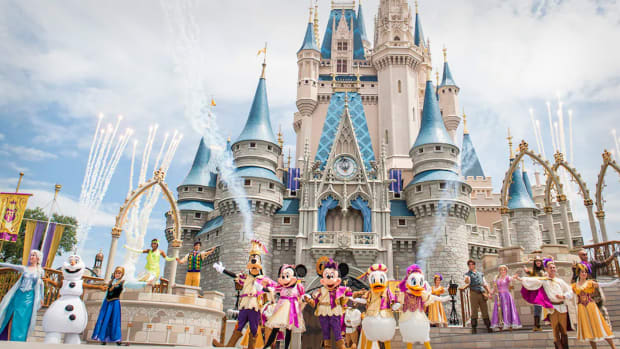After a week’s worth of some of the worst publicity possible, Walt Disney (DIS) CEO Bob Chapek has denounced Florida’s controversial “Don’t Say Gay” bill, and has asked to meet with Florida Governor Ron DeSantis. He admitted that his previous statements "didn't get the job done" also said that Disney will donate $5 million to organizations, including the Human Rights Campaign, that work to protect LGTBQ+ rights.
“I know that many are upset that we did not speak out against the bill,” Chapek said during the company’s annual shareholder meeting. “We were opposed to the bill from the outset, but we chose not to take a public position on it because we thought we could be more effective working behind the scenes, engaging directly with lawmakers on both sides of the aisle.”
But most notably, Chapek has not said that Disney will stop donating money to the politicians backing HB 1557. It’s unlikely that he will, which means it is unlikely that the deluge of public scorn he’s currently facing will abate anytime soon.

Disney
What Is Florida's "Don't Say Gay" Bill?
In February, Florida's House of Representatives passed the controversial bill HB 1557, formally known as the Parental Rights in Education, but widely referred to as the “Don't Say Gay" bill. It has now passed the Florida Senate and is awaiting the signature of Republican Gov. Ron DeSantis, which is widely assumed to be a fait accompli, it will go into effect July 1.
The bill will prohibit classroom instruction on sexual orientation or gender identity from kindergarten through third grade, and proponents say it will keep parents informed about what's happening in the classroom, and will prevent children from exposed to ideas about gender and sexuality they are too young to understand.
But opponents of the bill say that it will lead to more harassment and bullying of LGBTQ youth, who face a disproportionate risk of a bullying and a greater risk of suicide compared to their straight, cisgender peers.
The bill would also allow parents to bring civil suits against a school district for any potential violation, which opponents stress could open educators up to a stream of distracting lawsuits.
Florida Politics Causes Headaches For Disney
The Orlando Sentinel recently broke the news that Disney financially backed all of the sponsors of Florida’s “Don’t Say Gay” bill. Campaign finance records reviewed by The Independent uncovered that Disney gave the chief Republican sponsors of the legislation $4,000 combined for their 2022 re-election campaigns, as well as thousands of dollars to campaigns supporting GOP legislators who back the measure.
Trying to curtail a larger backlash, Chapek responded with a statement to “Good Morning America,” noting that "The biggest impact we can have in creating a more inclusive world is through the inspiring content we produce." This statement was poorly received, as critics note that Chapek did not denounce the bill or apologize for his company’s support.
Chapek faced criticism from, well, a good many people, including Emmy-winning documentary filmmaker Abigail Disney, the daughter of former Disney animation head Roy E. Disney and great-niece of Walt Disney.
Many on Twitter pointed out that Chapek’s predecessor Bob Iger condemned the bill on Twitter two weeks ago, as has President Biden.
Chapek then followed-up with a memo expressing “unwavering support” for the LGBTQ community, noting that the company provided “nearly $3 million to support the work of LGBTQ+ organizations.” But Disney employees, particularly queer ones, as well as the Animation Guild's Executive Board and QueerTAG Committee condemned the company, noting that he hadn't pledged to withdraw financial support for the bill’s backers.
Chapek later said he called DeSantis to discuss the matter. Unsurprisingly, the Governor's office announced that his position on the legislation hadn't changed.
Disney Plays Both Political Sides
Disney routinely donates a great deal of money to Republican politicians. It also routinely donates a great deal of money to Democratic ones. It has given money to politicians ranging from House Speaker Nancy Pelosi, a Democrat to Texas Senator Ted Cruz, a Republican, according to data from Open Secrets.
Plenty of companies do this, as they often feel they have no choice.
For example, Netflix (NFLX) CEO Reed Hastings is a long-time advocate for charter schools, and gives money to both Republicans and Democrats who support this cause. But this maneuver can always be tricky for companies, as Hastings came under fire in 2019 when he said Netflix would stop filming in Atlanta if an abortion band was upheld, but Popular Information reported that he donated $143,000 to 73 Missouri legislators who supported a similar abortion ban.
But why do so many companies donate to both sides of the aisle, especially when, in the case of Disney and Netflix, they often have LGBTQ content or employees that would seem to naturally align them more with Democratic politicians?
“Companies, like most individuals, have interests and concerns that extend beyond one single issue, no matter how emotion-laden that issue is. As important as social issues are in today’s world, the Walt Disney Company also has to consider the more practical issues that affect how it conducts business –regulations impacting businesses, tax rates, land use, and labor laws, for instance,” explains Gerard Filitti, Senior Counsel at The Lawfare Project, an international non-profit legal think tank and litigation fund based in New York City.
“In general, it’s fairly common for companies (or their executives or board members) to make contributions to politicians on both sides of the aisle. These contributions are often a form of relationship-building, and help foster connections between a candidate or elected official and the company,” says Filitti.
“These connections can be called upon, for example, when some legislation is under consideration that would affect the way in which the company operates, or its ability to sustain its profits. Political contributions are not generally made out of concern of angering one side or the other, but rather for the opportunity to reach an elected official’s staff when an issue arises that the company has an interest in.”
In the case of Disney and Florida, the company has 77,000 employees at Disney World alone, and as Filitti notes, “for companies that employ as many people as Disney, labor laws and regulations are important and affect their bottom line - everything from minimum wage to required compensation and benefits affect how companies operate.
“At a local level, zoning and land use are important considerations for where companies operate and what kinds of operations they can engage in,” he adds. “Political contributions are a way for these companies to have a voice in the laws and regulations that come into effect.”
A giant company like Disney feels like it can’t afford to alienate anyone, as gay couples with adopted children buy theme park tickets, but so do families where everyone has agreed to not talk politics at the dinner table, lest grandpa share upsetting opinions.
“The reason why Disney supports both sides of the political fence is that the company, as a whole, is dedicated to the idea of family and family fun and enjoyment, and wants to be seen, in Florida at least, as being a good neighbor, says James Watts, a self-described lifelong Disney fanatic who has spent most of his vacation time at the Parks. “They realize that the families that love their brand fall on both sides of the political spectrum.”

Disney
Disney Backs Away From Politics Under New Leadership
It wasn't that long ago that Disney, under the leadership if Iger, seemed to have a bit more skin in the game. In 2016, Disney threatened to boycott Georgia if an anti-LGBTQ bill was enacted.
"Disney and Marvel are inclusive companies, and although we have had great experiences filming in Georgia," the company said in a statement at the time, "we will plan to take our business elsewhere should any legislation allowing discriminatory practices be signed into state law.”
But don’t expect any actions like that in future, because since Chapek became CEO in February 2020, the former Democrat turned Independent has been reluctant to wade into political matters, and has reportedly expressed concern that Disney appears too liberal, according to The Hollywood Reporter.
As part of his call with the Gov, Chapek said he expressed the company’s “disappointment and concern that if the legislation becomes law it could be used to target [LGBTQ] kids and families. The governor heard our concerns," he said. "DeSantis committed to me that he wanted to make sure that this law could not be weaponized in any way by individuals in the state or groups in the state to unduly harm or target gay, lesbian, nonbinary or transgender kids and families.”
Disney Has Been Pro LGBT
Disney has long had a history of treating its LGBTQ employees well, and it has provided health benefits to its employees' same-sex partners since 1995, long before such a practice was a common corporate workaround for gay marriage bans. The company also has unofficially been hosting Gay Days, where LGBTQ members visit in mass, since 1991. The company never authorized this event, but it also didn't do anything to stop it.
The hashtag #BoyCott Florida has been trending on Twitter lately. The Florida boycott is seemingly being modeled on the boycott of North Carolina over its “Bathroom Bill,” widely seen by critics as discriminatory to the transgender community, cost the state $3.76 billion and was later repealed.
Who Will Chapek Do?
There’s few things a company values more than its public reputation, and right now Disney’s has taken a big hit, and at least from its perspective, it has no good options. Either risk the ire of Republican lawmakers, or risk a deepening public backlash and the anger of is employees and, quite possibly, the loss of workers during an ongoing labor shortage, a prospect it can ill afford.
On March 22, the company will host a “Reimagine Tomorrow” panel focused on “issues of concern to our LGBTQ+ colleagues.” It’s very clear what his employees want to hear from Chapek. What he feels he can say to them is another matter. But for now, it's clear that rying to have it both ways is really only working for one side.







